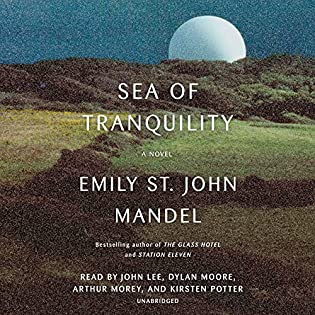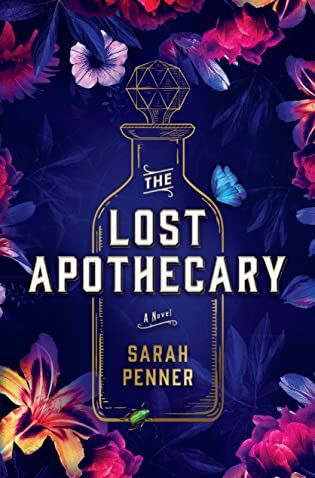 Sea of Tranquility by Emily St. John Mandel
Sea of Tranquility by Emily St. John Mandel Narrator: John Lee, Dylan Moore, Arthur Morey, Kirsten Potter
Published by Random House Audio on April 5, 2022
Genres: Contemporary Fiction, Fantasy/Science Fiction
Length: 5 hours 47 minutes
Format: Audio, Audiobook
Source: Audible
Buy on Amazon, Buy on Bookshop
This post contains affiliate links you can use to purchase the book. If you buy the book using that link, I will receive a small commission from the sale.
Goodreads
The award-winning, best-selling author of Station Eleven and The Glass Hotel returns with a novel of art, time, love, and plague that takes the reader from Vancouver Island in 1912 to a dark colony on the moon three hundred years later, unfurling a story of humanity across centuries and space.
Edwin St. Andrew is eighteen years old when he crosses the Atlantic by steamship, exiled from polite society following an ill-conceived diatribe at a dinner party. He enters the forest, spellbound by the beauty of the Canadian wilderness, and suddenly hears the notes of a violin echoing in an airship terminal—an experience that shocks him to his core.
Two centuries later a famous writer named Olive Llewellyn is on a book tour. She's traveling all over Earth, but her home is the second moon colony, a place of white stone, spired towers, and artificial beauty. Within the text of Olive's bestselling pandemic novel lies a strange passage: a man plays his violin for change in the echoing corridor of an airship terminal as the trees of a forest rise around him.
When Gaspery-Jacques Roberts, a detective in the Night City, is hired to investigate an anomaly in the North American wilderness, he uncovers a series of lives upended: The exiled son of an earl driven to madness, a writer trapped far from home as a pandemic ravages Earth, and a childhood friend from the Night City who, like Gaspery himself, has glimpsed the chance to do something extraordinary that will disrupt the timeline of the universe.
A virtuoso performance that is as human and tender as it is intellectually playful, Sea of Tranquility is a novel of time travel and metaphysics that precisely captures the reality of our current moment.
Sometimes I feel like books find us when we need them. I read Emily St. John Mandel’s wonderful book Station Eleven and found it unlike anything I’d read before. And then, I found myself living amidst a pandemic, and snatches of that book came back to me and terrified me. As soon as I heard about Sea of Tranquility, I put it on my to-read list. There were passages of great beauty in Sea of Tranquility, but more than anything, what I admired about the book was recognizing what it was like to live through a pandemic and what it is like to contend with understanding the impact of colonization and even to wonder if the reason everything seems surreal is that we’re living in a simulation.
Emily St. John Mandel has said she is fascinated with the way we behaved in February 2020, when we could see the pandemic distantly but really didn’t understand it would affect us in the United States in the same way as it affected people first in China. I remember my own thinking at the time was that SARS had been contained, and Ebola had been contained. Still, as Mandel reminds us in this book, SARS can always come back in a new guise—my understanding is that we owe the speed with which a vaccine was developed for COVID to the fact that research had long been underway on how to vaccinate for SARS using mRNA vaccines. One of the characters in Sea of Tranquility has written a pandemic novel—Olive Llewellyn seems to be a version of Emily St. John Mandel contending with the popularity of Station Eleven and its adaptation (which is also great!). In Olive’s novel Marienbad, she writes
We knew it was coming.
We knew it was coming and we prepared accordingly, or at least that’s what we told our children—and ourselves—in the decades that followed.
We knew it was coming but we didn’t quite believe it, so we prepared in low-key, unobtrusive ways—”Why do we have a whole shelf of canned fish?”…
We knew it was coming and we were breezy about it. We deflected the fear with careless bravado…
Pandemics don’t approach like wars, with the distant thud of artillery growing louder every day and flashes of bombs on the horizon. They arrive in retrospect, essentially. It’s disorienting. The pandemic is far away and then it’s all around you, with seemingly no intermediate step.
I found myself nodding along as Olive contemplates the surreality of living through a pandemic—meeting via hologram (and how exhausting it is) is the Zoom of 2203; the loneliness is the same. Olive’s contemplation of the sirens and what they mean is chilling. I remember during one particularly surreal moment in 2020, a local church sent a car around the neighborhood with a recording playing over a loudspeaker that they were praying for everyone. Olive reflects during one of her holographic interviews:
My point is, there’s always something. I think, as a species, we have a desire to believe that we’re living at the climax of the story. It’s a kind of narcissism. We want to believe that we’re uniquely important, that we’re living at the end of history, that now, after all these millennia of false alarms, now is finally the worst that it’s ever been, that finally we have reached the end of the world.
After that section of the novel, I had to pause the audiobook and cry for a minute because it seemed like something slid into place. Our world is not uniquely terrible. Living through the pandemic was not uniquely terrible. The world has always been terrible. Imagine what it was like to live through the Plague. Yet in the midst of all that terribleness is beauty. It’s impossible to read Sea of Tranquility without glimpsing those moments of beauty, too. What we don’t always understand is that we create those moments, in spite of everything.
 The Lost Apothecary by
The Lost Apothecary by 
 The Age of Innocence by
The Age of Innocence by 